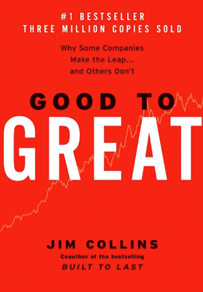Suggested Reading
Browse by Subject
-
Good to Great
Why Some Companies Make the Leap…and Others Don’t
by Jim Collins
In what Collins calls a prequel to the bestseller Built to Last he wrote with Jerry Porras, “Good to Great” explores how good or even mediocre companies can be turned into ones that achieve long-term superior performance. To find the keys to greatness, Collins and his team identified 11 companies that made the leap from Good To Great and discovered the characteristics of greatness—why some companies make the leap and their industry counterparts don’t. Collins introduces concepts such as Level 5 Leaders, The Hedgehog Concept, A Culture of Discipline, Technology Accelerators, and The Flywheel and the Doom Loop. The findings provide valuable insight to anyone building a company with the potential to become great and enduring. While some of the findings may be counterintuitive, most are simple and common sense. “Good to Great” doesn’t hold all the secrets to success but it is smart, thought-provoking, compelling and tackles big questions.
-
Necessary Endings
The Employees, Businesses, And Relationships That All of Us Have to Give Up in Order to Move Forward
by Dr. Henry Cloud
One of the most important abilities a leader can have is knowing when and how to let go when something, or someone isn’t working—an employee, a business relationship, a sacred cow, a losing product or service, a set of assumptions, a poor business model, or even an entire business. Letting go is essential for business success. Getting to the next level in business always requires ending something you are doing today, leaving it behind, and moving on. Necessary Endings gives readers the tools they need to confront the brutal facts, say good-bye to what’s not working and move on.
-
The Effective Executive
The Definitive Guide to Getting the Right Things Done
by Peter Drucker
There are hundreds of books on the topic of executive effectiveness, but there have been very few things said in the interim that Peter Drucker hadn’t already figured out in the 1960s. What makes an effective executive? The measure of the executive, Drucker reminds us, is the ability to “get the right things done.” This usually involves doing what other people have overlooked as well as avoiding what is unproductive. Drucker identifies five practices essential to business effectiveness that can, and must, be learned: managing time, choosing what to contribute to the organization, knowing where and how to mobilize strength for best effect, setting the right priorities, and tying all of them together with effective decision-making. When you reduce his ideas down, they seem obvious. But it took this teacher of wisdom to combine these insights into a book.
-
Leadership is an Art
by Max De Pree
Leadership is an Art says more about leadership in clearer, more elegant, and more convincing language than many of the much longer books that have been published on the subject. De Pree looks at leadership as a kind of stewardship, stressing the importance of building relationships, initiating ideas, and creating a lasting value system within an organization. Rather than focusing on the “hows” of leadership, he explains the “whys.” He shows that the first responsibility of a leader is to define reality and the last is to say thank you. Along the way, the artful leader must: stimulate effectiveness by enabling others to reach both their highest potential; take a role in developing, expressing, and defending values; nurture new leaders; and ensure the continuation of the corporate culture. This is a must-read on the topic of leadership and business management.
-
Influence
The Psychology of Persuasion
by Robert Cialdini,
Persuasion is at the heart of business, where leaders must reach customers, clients, employees, and suppliers. Influence is a classic book on the core principals of persuasion and is a great example of how psychological principles apply to the business world. You’ll learn the six universal principles of ethical persuasion: reciprocity, commitment and consistency, social proof, liking, authority, and scarcity. Cialdini shows how to use the principles to become a skilled persuader—and how to defend yourself against them. Based on research and interviews — with a wide range of top persuaders—Cialdini explains the psychology behind what moves people to say “yes” and how to translatethis information into the real world.







